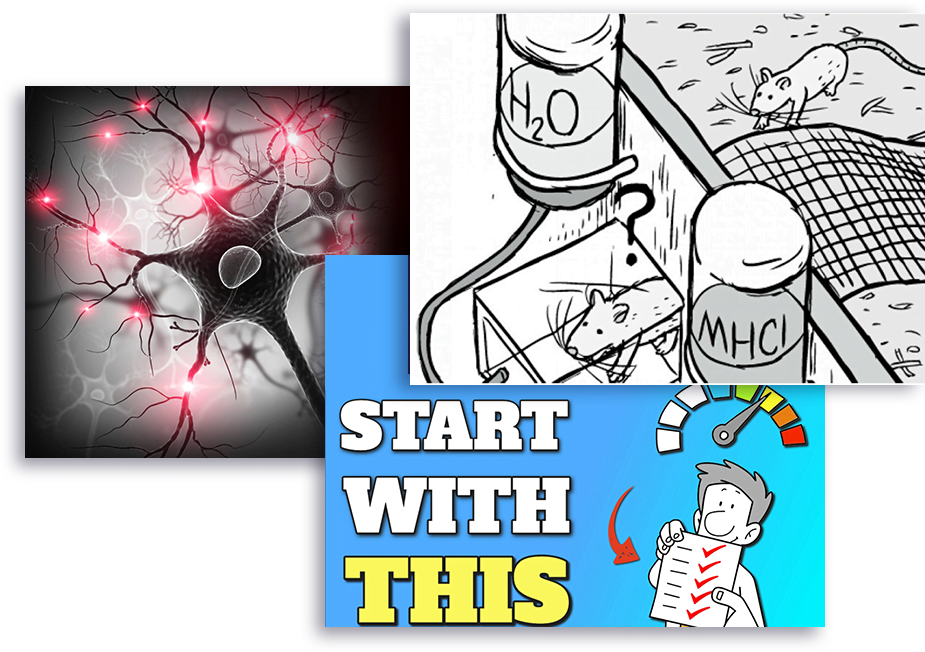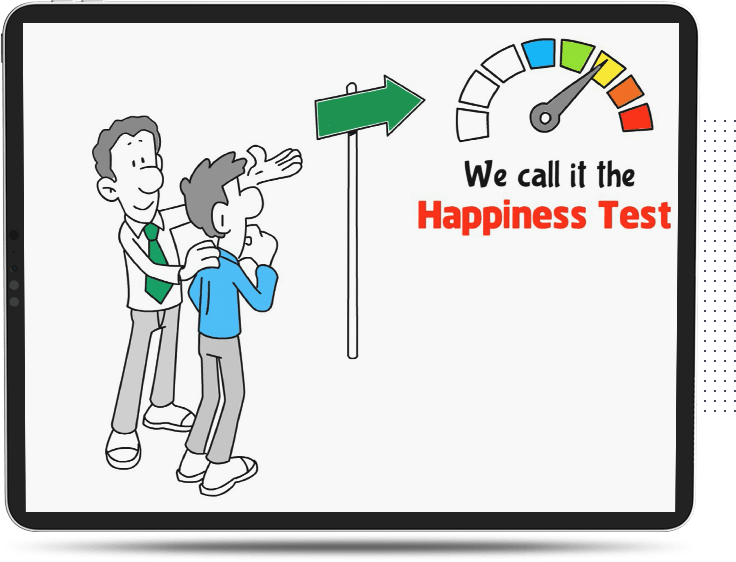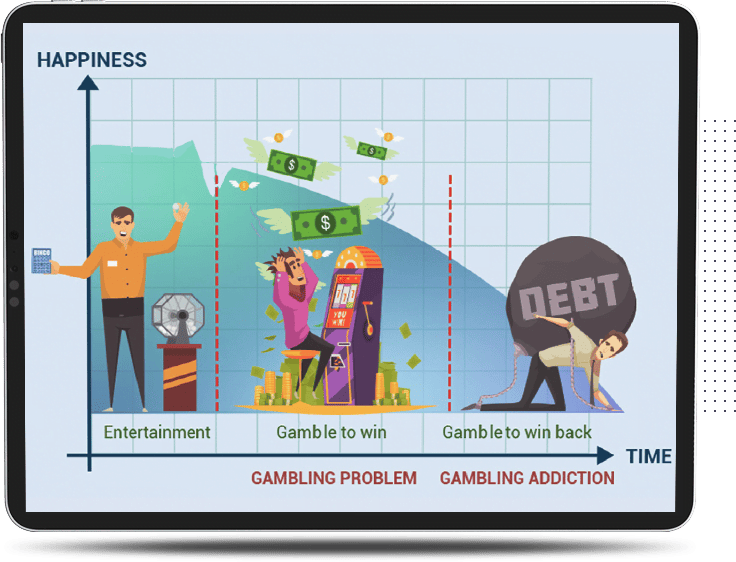Challenge Status Quo of Gambling Addiction
What is addiction? Why do we get addicted? Is there perhaps more to it than you previously thought? Have you considered the possibility that quitting is difficult because the addiction is doing something for you?
- What if gambling isn’t addictive?
- What is the secret of the cage?
- What is the Happiness Test?
What happens if…
- …gambling addiction isn’t an illness?
- …heroin isn’t addictive?
- …a happy person is more resistant to addiction?
WHAT WOULD THAT MEAN TO YOU?
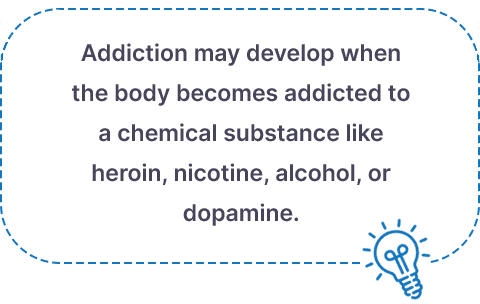
The typical view of addiction is that we get hooked by a substance, and then we crave it all the time. Can you relate to that? Where is that view coming from?
It’s time to challenge how you view addiction. This article could be perceived as challenging, and some might find it offensive. Its purpose is not to offend but rather to give you a new perspective of addiction and how you can get rid of it!
Give us 10 minutes, and we will tell you all about the Secret of the Cage.
What is The Secret of The Cage?

During the 1950s, scientists experimented on mice. They placed each mouse in a shoebox-sized cage. Then the mouse got two choices of water. One bottle had fresh, clean water. The other bottle contained water spiked with heroin.
In a few days, all mice preferred the spiked water. Soon enough, the mice stopped eating and were constantly intoxicated. As a result, all mice died either from starvation or overdose.
The researchers concluded that heroin is highly addictive. So addictive that the mice lost all will to do anything but be high.
During the worst days of the Vietnam War, 100,000s American soldiers used heroin to cope with all the horrors. The authorities feared that the American streets would be crowded with heroin addicts once the soldiers returned home.
But that didn’t happen!
Upon arrival on US soil, 95% of the soldiers stopped using heroin, as if they had never used it at all. They for sure suffered terrifying nightmares, but they never touched heroin again.
How could they just stop?
Did you know that when someone, for example, your grandmother, breaks their leg and is hospitalized, they will be injected with pure heroin? It’s true; heroin is commonly used as a painkiller. However, you might know it better under a different name: MORPHINE.
If anyone is treated with morphine for three weeks, they should, by all logic, become addicted. But most won’t be. Why is that?
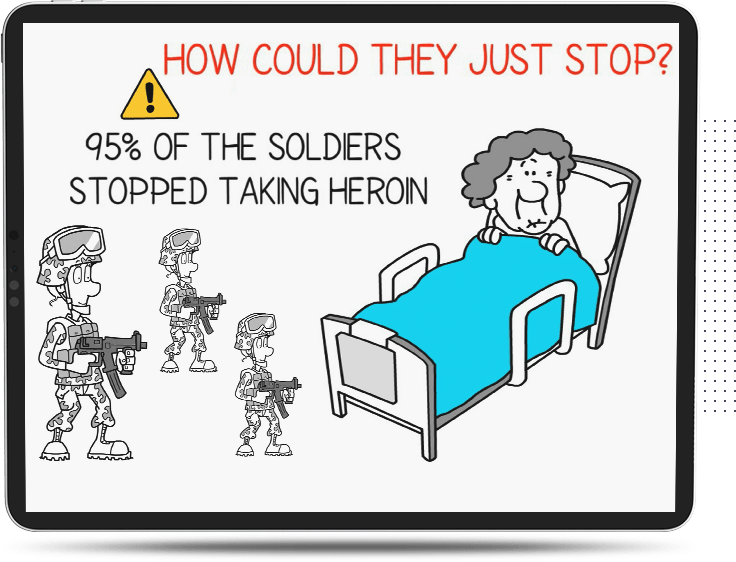
THERE’S SOMETHING NOT QUITE RIGHT HERE…
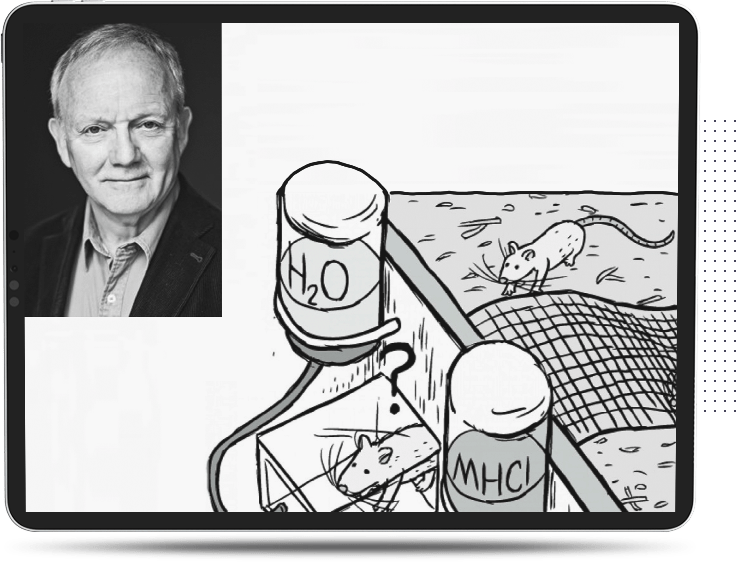
Professor Bruce Alexander at Vancouver University had the same thoughts back in the 1970s.
Perhaps it’s not the drug that’s the problem. Maybe it’s the cage… Imagine that you’re forced into an extremely tight space – alone. You have nothing to do except choose to drink regular water or something else that makes you feel like you have wings!
Which water would you choose?
Professor Bruce Alexander redesigned the experiment. He created a rat park. Just like in any mouse-heaven, there was a lot of cheese, running wheels, toys, and other mice to play with. He then presented the mice with the same two options of water.
Now, something peculiar happened! None of the mice preferred the spiked water. Sure, they might have taken an occasional sip or two, but none of them showed any symptoms of addiction. None of them died. The change in cage and surroundings cut the death rate from 100% to 0%!
Bruce Alexander concluded that it’s not heroin that is addictive. The cage made the mice use it to escape their mundane reality.
What does your cage look like? In a minute, we’ll help you find out. Before we get that far, though, let’s visit a country almost as cheese-crazy as the craziest mouse – Switzerland!
In the 1990s, Switzerland had huge problems with heroin addiction. The government chose to legalize heroin and opened clinics where the addicts could get free clean heroin to counteract the problem. (The good stuff, not some crap they would find on the street.)
Each person could determine their daily dose. After the heroin dose in the morning, each addict went to work. And this is one of the keys! In addition to pure heroin, the addicts got someplace to live and a job!
Again, something peculiar happened! Most of the addicts started to lower their doses. Many quit completely. The deaths from overdose dropped to almost zero!

By not shaming the addicts but rather creating new meaning in their lives, the demand for heroin almost disappeared. To be sober suddenly felt more tempting than being intoxicated did.
Consider this; a cage might not be similar to a tiny shoebox, and the bars might be invisible… What does your cage look like?
The Happiness Test Identify Your Cage
We won’t do an ordinary gambling addiction test. The result of that you’d already know… Instead, we will do something completely different. We want to identify “your cage” and inspire you to think about why you’ve become addicted to gambling. Remember, we don’t believe that gambling is the real problem; it’s simply a symptom.
To help you, we’ve created a unique test. We call it the Happiness Test. By looking at how well your needs in life are met, we can understand how at-risk you are at developing an addiction.
The Happiness Test aims to:
- Make you think about your quality of life and addiction.
- Help you identify the cage you live your life in.
- Be the foundation for your development plan to quit gambling.
Maslow’s Hierarchy of Needs
Our motivation is strongly connected to our needs. If you’re swimming and suddenly find yourself underwater, your first thought is not how people will perceive you in the water… it’s I NEED TO GET AIR!
According to Maslow’s Hierarchy of Needs, all humans have 5 levels of needs. There are some individual deviations, but in general, we have the following:
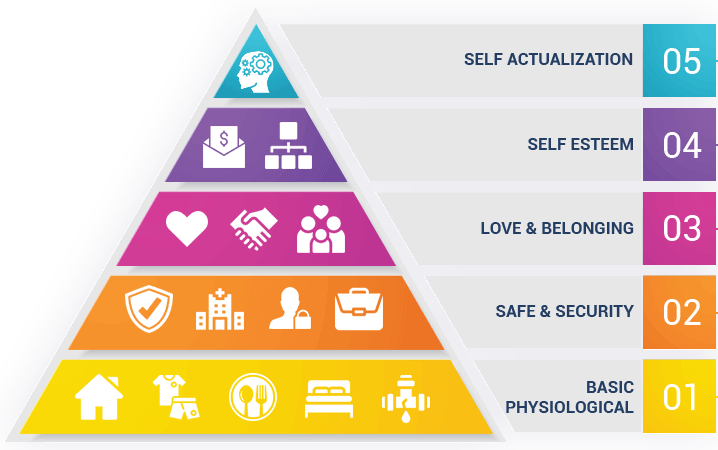
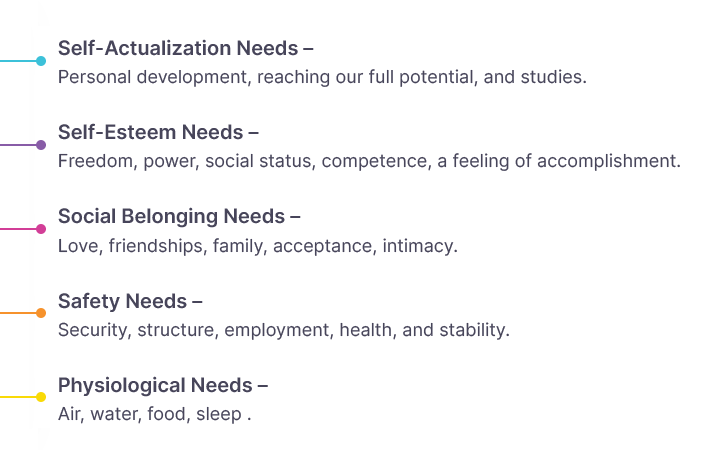
Our physiological needs are essential for our survival. Without air, a human will die within a few minutes. Similarly, it’s more important to have peace than to fulfill our social needs.
For a family fleeing a war, survival is the prime incentive. In the moment of flight, safety is more important than the feeling of belonging to people around them.
The first three levels of needs are related to survival. They are central needs that have made humans endure. Belonging to a group was vital when we lived on the African savanna 50,000 years ago. To be left out meant certain death. Our ability to collaborate is the main reason we have survived.
Now, for the first time in history, humans can live alone. However, it doesn’t mean that we mentally enjoy it. We will not feel good if we don’t satisfy our social needs. This is something we will work on here at QuitGamble.com.
Have you ever heard of intrinsic and extrinsic motivation? If you play the piano every day because you love playing to yourself, you have an intrinsic motivation to play the piano. If you’re a concert pianist and have to practice for a performance, it’s probably extrinsic motivation that drives you.
Simply put, intrinsic motivation is the things you do for yourself. Extrinsic motivation is the things you do to get others to like you. Making money is often driven by extrinsic motivation; the same goes for status and power. Many studies, however, shows we rarely get happier by extrinsic motivation.
On the other hand, if we do things for others (without personal gain), or we do things because we love them (intrinsic motivation), we feel good and get happier.
Why are we telling you all of this? Sure, it’s interesting, but what’s the point?

Our unique test links your satisfied needs and happiness. The Happiness Test will not tell you if you’re addicted to anything. It will, however, indicate if you’re at risk of being or becoming addicted.
At the same time, the ‘Happiness Test’ is a tool to pinpoint from what end we should start helping you. By identifying your cage, we can give you the support you need to satisfy your current needs.
As a member of QuitGamble.com, you’ll become an essential cog in our online community, meaning you can also help others. And helping others, as you now know, can make you feel better about yourself too!
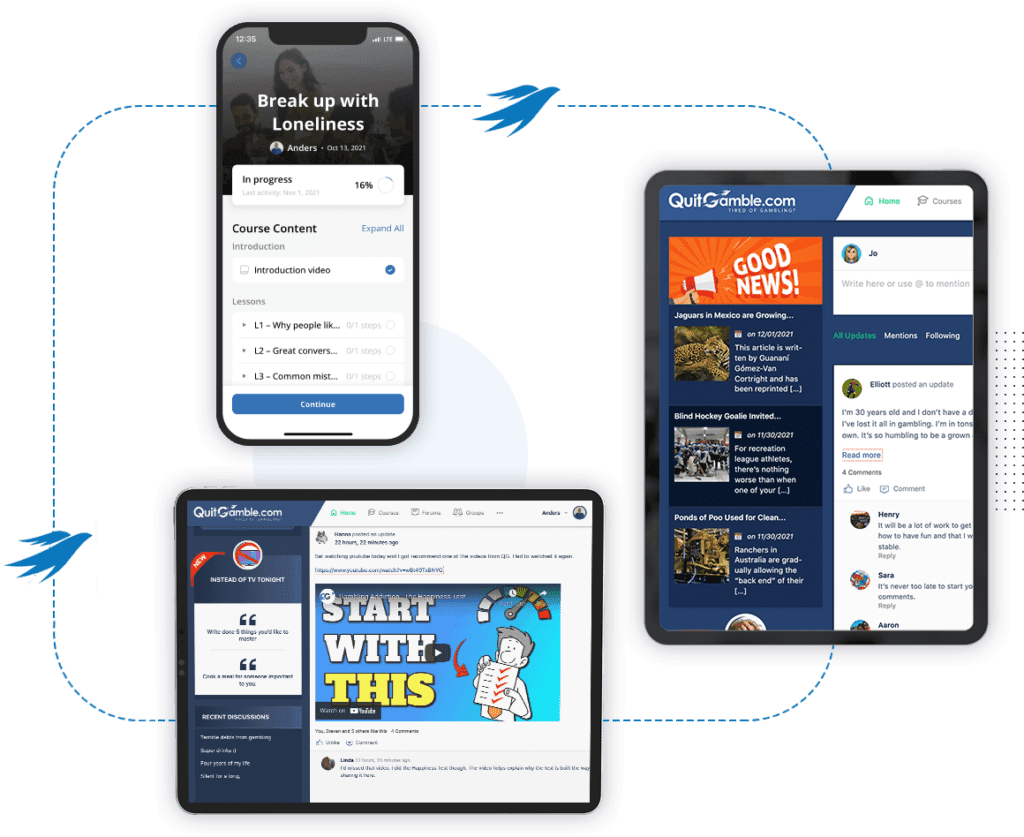
Members Also Benefit From:
- You get an individual plan to stop gambling and kick addiction’s ass.
- You can chat and make new friends in our community.
- You can share your stories and read other people’s stories.
- You’ll get tips on talking to and communicating with people around you.
- You’ll get inspiring and supportive emails with tips for moving forward.
We’ll challenge you to challenge yourself.
And we’ll do everything we can to support you on your journey!
Gambling Addiction is Not an Illness
Before we present the next powerful tool, we’d like to go back to the initial assertion: what if gambling addiction is not an illness?
By labeling gambling addiction an illness, we make the addict a victim. More importantly, it makes them feel powerless! Furthermore, the label of “being sick” also strips away personal responsibility.
We don’t want to create any victims because you are not a victim! You alone have the deciding power over yourself and your actions. It means you can do something about your situation.
Gambling addiction is not a sickness, but like the rehabilitation of a broken leg, you should avoid leaning on it until it’s healed. In your case, it means you need to stay away from gambling. While you recuperate, you can lean on the QuitGamble.com community. We’ll do our best to support you – for as long as you can heal properly.
Congratulations! You have just taken the first step on a life journey where you’re in the driver’s seat!
The Gambling Addiction Curve
Let’s focus on gambling problems and gambling addiction. Is there such a thing as responsible gambling? Our opinion is that it depends on your definition of the word “gamble.”
If the definition of gambling mainly focuses on entertainment, then the answer is YES. Then you can play responsibly. When we say “entertainment,” we refer to gambling for fun or for excitement once in a while.
If the definition of gambling instead focuses on winning money, the answer is NO. Then, in our opinion, you can’t gamble responsibly. If you gamble to win, you’re jumping in head first at the deep end, hoping for the best. And no, if you happen to be winning does not change this fact.
Let’s try to better understand the terms gambling problem and gambling addiction:
- Gambling Problem: The negative consequence of gambling isn’t overshadowing the fun parts for a problem gambler. It means that it’s fairly easy to handle the gambling problem, as it’s not causing major issues. Unfortunately, this also means that the person might not see gambling as a problem yet.
- Gambling Addiction: A compulsive gambler often knows they have a problem, making it easier to admit to and thus seek help. Unfortunately, at this point, the addiction has often become so strong that it’s difficult to break free of it.
The Gambling addiction curve seen above is divided into three parts.
- Gambling for Entertainment
- Gambling to win money
- Gambling to win back money.
Let’s take a look at each one of these parts. You’ll soon see the connection between problematic gambling behavior and gambling to win money, followed by gambling addiction and trying to win back money.
Gambling For Entertainment
We’re getting ahead of ourselves, so let’s go back to gambling for entertainment. Even if we advise against all gambling, especially if you are at risk of addiction, there are some less harmful games.
- Raffle tickets supporting a charity or good cause.
- An occasional scratch card.
- Playing with small bets while visiting a casino on vacation.
We don’t recommend any of the above. At the same time, life is about experiences, and visiting Las Vegas is on plenty of bucket lists.
You might dream of betting $100 on number 13 at the roulette table in Vegas just to see what happens. And if you find yourself in Vegas, why not make that dream come true? Similarly, supporting the local sports club or another good cause by purchasing a scratch card is not about winning money. You do it for the experience and as a nice gesture.
As long as the experience is what you’re after, you should be okay.
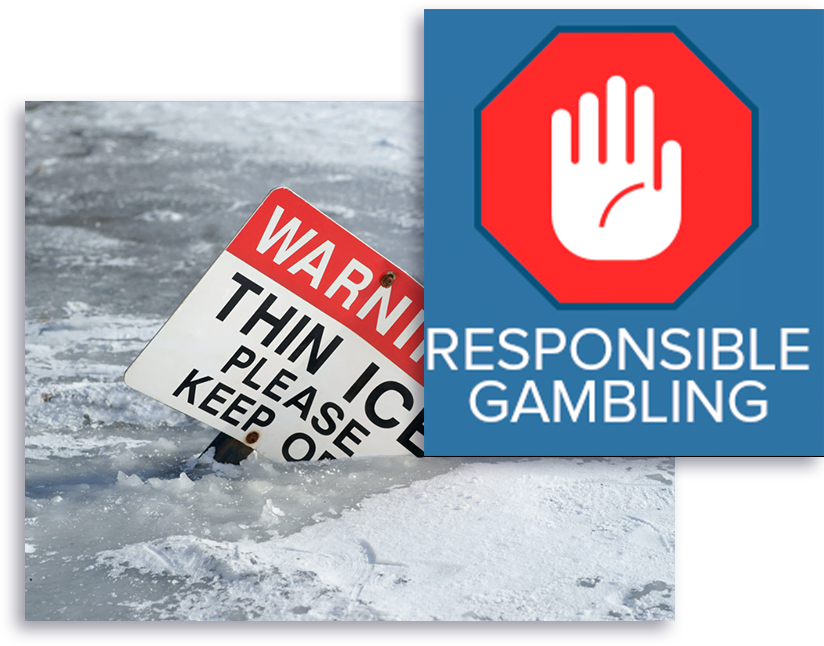
Gambling to Win Money
Naturally, you’d never buy a scratchcard if you knew you didn’t have a chance to win something. A person who buys scratch tickets for the fun of it buys it for a minute of excitement and the possibility that, just perhaps, they can win something.
A person who gambles to win will probably buy more than just one ticket. They’ll more likely buy ten. (Even though the return to player is typically less than 50%. It says so on the back of the ticket. In other words, it’s a mathematical suicide and logically makes no sense.)
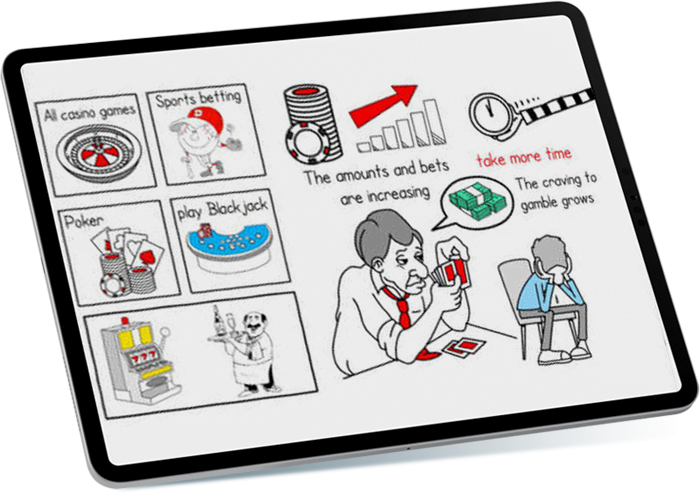
Games focusing on winning money:
- All games at online casinos.
- Sports betting: when you gamble on more games than you watch.
- Poker: both casino poker and peer-to-peer poker.
- All table games and other house-banked games.
- All slot machines
When a person gambles to win, some of the following often happen:
- The amounts and bets are increasing
- Gambling takes up more time
- There is a clear motive to win
- The craving to gamble grows
- They think about gambling even while not gambling.
When you gamble to win, you play with fire, especially if you are in the at-risk zone of becoming an addict. Does it ring a bell? Has the curve started to slope downwards for you? If you’re out on thin ice, you better be prepared to get wet.
Where do you see yourself on the curve?
We reckon that all casino games are about winning money. All gambling commercials emphasize your winning chances – they never tell you to deposit money just to have fun. It’s always about you having the opportunity to win big money…
Sure, slot machines can be entertaining, but the risk that everything goes down the drain is significant, particularly if you win initially. (Read more about what happens when you win here.)
The same thing can happen with sports betting. If you start betting on a lot of games or increase the stakes per bet, you’re rapidly risking spiraling out of control.
Likewise, everyone who plays poker knows that it’s a game of winning or losing money. Poker doesn’t work without monetary stakes.
Even successful professional poker players and sports bettors can have gambling problems. What differentiates them from the 95% of other players is that they win. Still, just because they’re ahead doesn’t mean they don’t have problems related to gambling too much.
When the stakes increase, things can get out of hand quickly. A big win can have catastrophic consequences and change gambling behavior. Suddenly, small wins are not giving the same positive kick anymore. The person moves further out on the Addiction Curve as the bets rise to keep the excitement going.
The person spends more time gambling. The craving for gambling increases, and focusing on other things except for the next game becomes difficult. Once enjoyable or necessary activities like work, school, etc., get pushed aside to free up more hours to gamble.
We often get the question of how fast a gambling addiction can develop. Most people say it takes years but, based on escape theory and what you’ve read above, the answer is that people can develop gambling problems very fast if they carry a lot of pain. If you want to know more, we recommend the following article.
Gamble To Win Back
The gambling continues to escalate, and the Addiction Curve is getting steeper. The awaiting crash is everything but pleasant. We don’t want to scare you, but we need to tell you what awaits if you continue gambling. QuitGamble.com is created to give you hope and guidance in your situation.
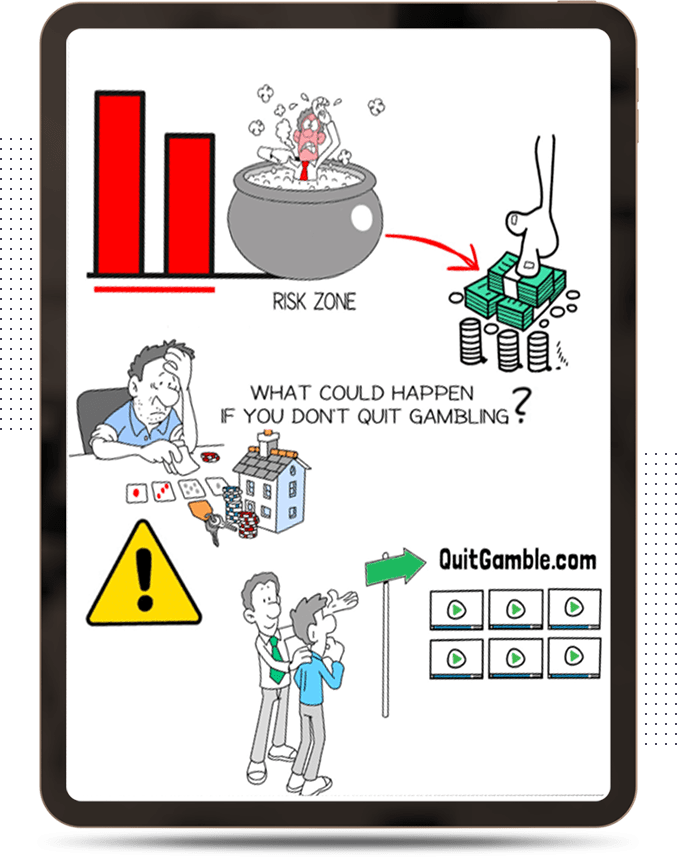
- Personal bankruptcy
- Divorce
- Prison
- Suicide
Even if things might look dark at the moment, there are ways to get out! You’re not alone. There are 100 000s of people in the same situation as you. We will do everything we can to help you!
Here are a few characteristics of the behavior at furthest out on the curve:
- The person lets the gambling control his life
- The person lies to people around
- The person borrows money from friends, family, and possibly even untrustworthy people like loan sharks.
- The person is not enjoying gambling anymore.
- The person is desperate to win back previous losses.
- The person is looking for new money to continue gambling.
- The person looks for a way out: the thought of suicide is common.
Does it feel familiar?
It’s time to do something about it. It’s time to get some help. The time for action is now! This website is created for you!
Action Plan Take The Next Exit!
If you’re still with us, you now know gambling in and of itself is not an addiction. It’s the flight from reality you’re addicted to. Therefore, a big part of the work over the following months will be to reduce your need to flee.
The ‘Addiction Curve’ was meant to alert you. It’s time to realize the importance of action. If you haven’t taken the Happiness Test yet, please do so now! That’s the first step toward identifying your cage.
It doesn’t matter where you are on the curve today. Take the next exit, and get help here! As a member of QuitGamble.com, you get access to powerful tools adjusted to your current needs. On top of that, our online community is just bubbling with information, inspiration, and encouragement. We hope to see you there!
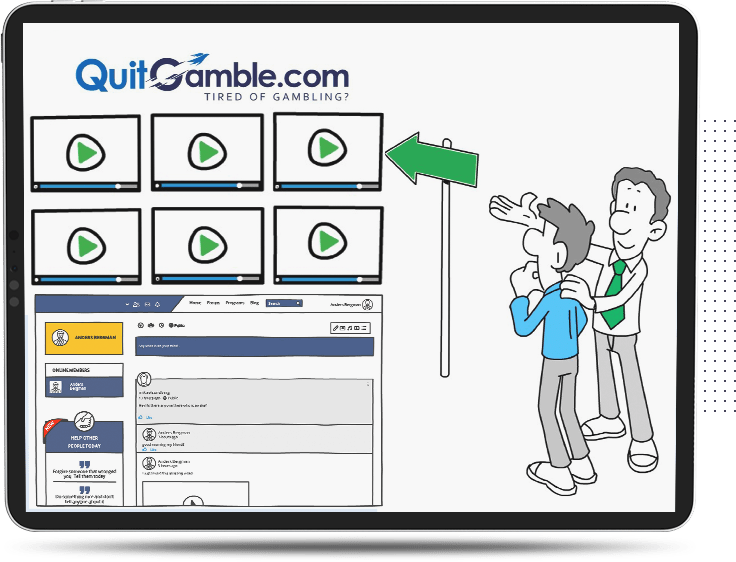
QuitGamble.com is available around the clock. Becoming an active part of QuitGamble.com is the best way we know for how to stop gambling. So start your journey toward a gambling-free life right now! Download our app, and you can instantly and effectively ban all gambling sites from your mobile and computer.
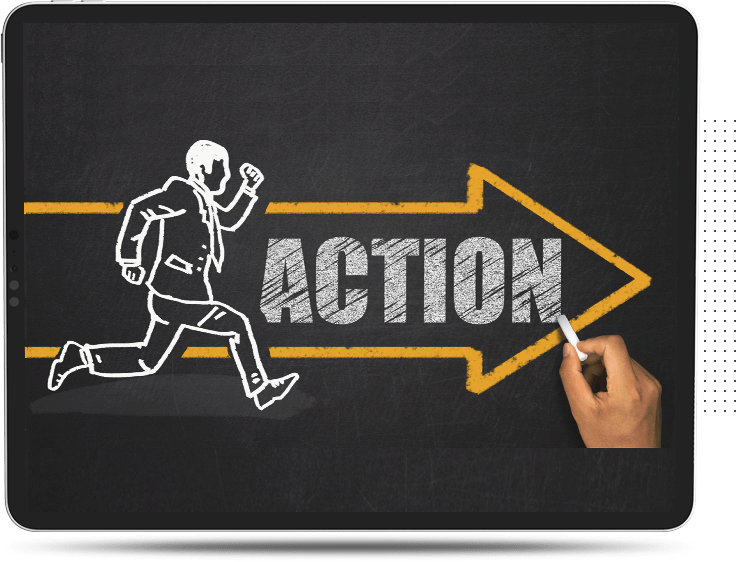
Your To-Do List
- Take the Happiness Test.
- Join our community (chat & forum).
- Share your story with other members of our community.
- Get your customized development plan to begin your journey.
- Open up to your family; we’ll give you useful tools. If you need help, read the guide on how to help a gambling addict.
- Join a local gambling addict group and supplement QuitGamble.com with physical meetings.
- Help yourself by helping others. Become an active member!
You’re precious! Your experiences, energy, and will to feel better are fantastic assets! At QuitGamble.com, we’ll help you realize your value by enticing and enlightening the best in you! Here, you have the opportunity to be part of something bigger.
Quitting gambling isn’t just about not gambling. It’s about changing your life. Get back in the driver’s seat of the great long road trip that life consists of, and enjoy the scenery! The first pitstop of today is the Happiness Test. It will help you understand your current road and enable you to take the next exit!
And always remember what happened to the mice when their cage changed…
Let’s start transforming your cage into an amusement park!
